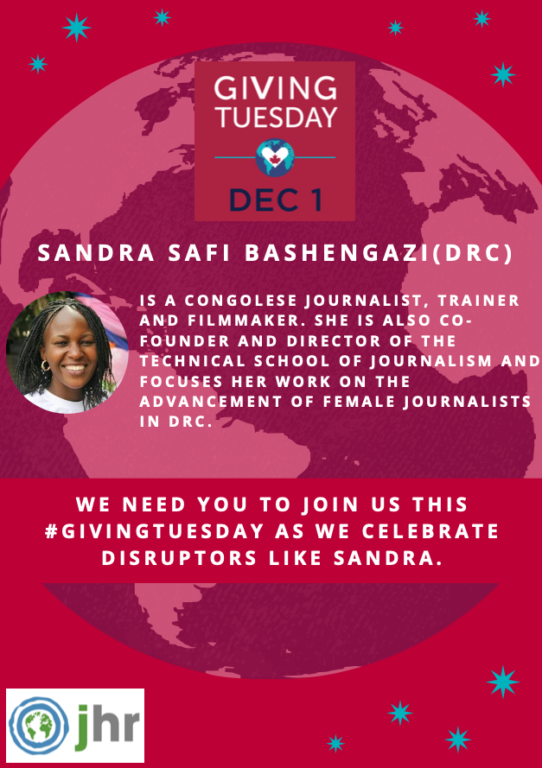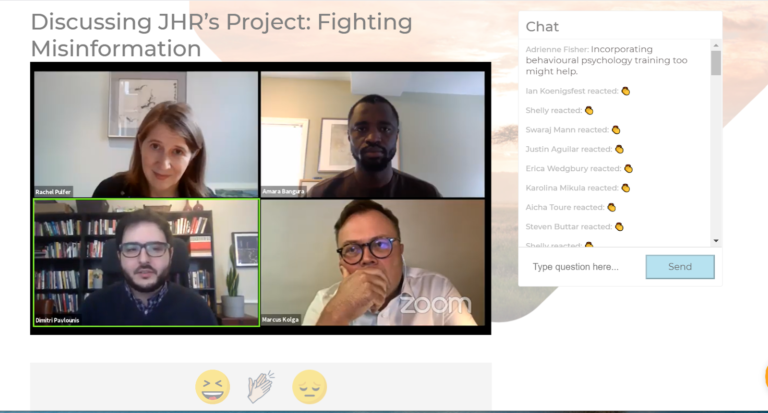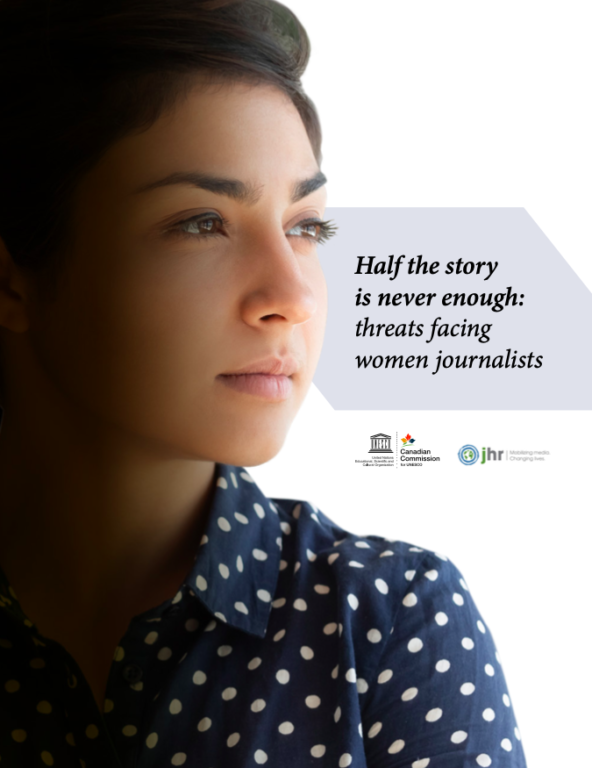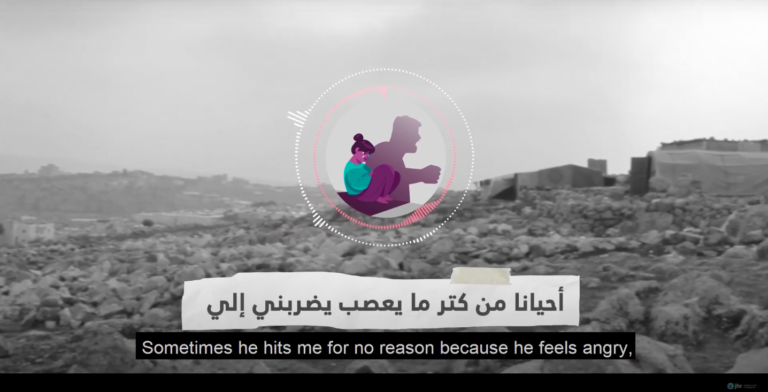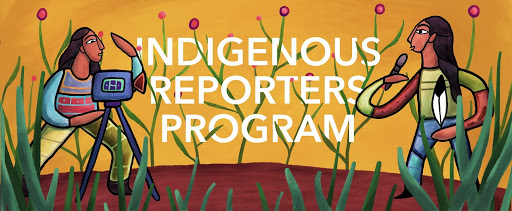This week’s highlights
- How YOUR support will make a real difference this #GivingTuesday
- Watch ‘Fighting Misinformation’: and check out the new JHR Truth Matters microsite
- Sign up to ‘Half the Story is Never Enough’ Webinar December 2
- Support the Launch of #16Days of Activism on The International Day for the Elimination of Violence Against Women
- Deadline approaching! Paid Opportunities for Indigenous Journalists to Work with Leading Media Across Canada
December 1st is #GivingTuesday!
How You Can Celebrate the Disruptors in 2020
Join Journalists for Human Rights (JHR) this #GivingTuesday as we Celebrate the Disruptors of 2020.
Throughout this holiday season we will share stories from across the globe of Disruptors: those who, in 2020, have had the courage to highlight the social divides the pandemic has exposed, and push for better.
For our #GivingTuesday feature this year, we are highlighting the incredible work Sandra Safi Bashengazi is doing in the Democratic Republic of Congo. Sandra is a Congolese journalist, trainer and filmmaker living in Bukavu in eastern DRC. She is also co-founder and director of the Technical School of Journalism and focuses her work on the advancement of female journalists in DRC. In the DRC, only 34% of journalists working in the media are women and of those who do manage to become journalists, very few occupy positions of power in the media. In the province of South Kivu only 14% of senior positions in the media are occupied by women.
Yet Sandra persisted. She co-founded a school for journalism and mentored women and student journalists. One of the stories she mentored helped put Frederick Bitumike, a parliamentarian responsible for mass rape in Eastern DRC, behind bars.
This is why the work Sandra does at the Technical School of Journalism is so important. With YOUR support Sandra can continue to provide proper training to female journalists in DRC.
YOU can help us make a difference TODAY! Click here to donate TODAY!
Thank YOU for helping Sandra and female journalists across the world to speak up.
Watch: ‘Discussing JHR’s Project: Fighting Misinformation’
We are pleased to share with you JHR’s webinar ‘Fighting Misinformation in Canada’ with disinformation expert and curriculum advisor Craig Silverman, journalism and media literacy trainer Aphrodite Salas from Quebec, journalism trainer Geoff Leo from Saskatchewan, journalism trainer Amara Bangura, disinformation expert Marcus Kolga, Dimitri Pavlounis, a media literacy expert from CIVIX Canada, and JHR executive director Rachel Pulfer.
The webinar coincides with the release of JHR’s new microsite jhr.ca/truth-matters: a free tool with resources for journalists and the general public including videos, academic studies and Marcus Kolga’s report unpacking the results and implications of JHR’s initial pilot fighting misinformation and citizen preparedness in Canada.
Click here to watch the recording and click here to visit the new JHR Truth Matters microsite.
More information on the webinar can also be found here.
The JHR Misinformation project is funded and supported by Canadian Heritage. JHR would like to thank CTV news for making the webinars possible.
Sign up to ‘Half the Story is Never Enough’: Webinar December 2
The Canadian Commission for UNESCO (CCUNESCO), World Press Freedom Canada and Journalists for Human Rights are proud to bring you a unique series of papers from women journalists from across the globe. The papers are now available on all three organizations’ websites including JHR’s publications page, here. You can also read panelist Karyn Pugliese’s piece ‘Racism, discrimination and trauma are driving Indigenous women out of media — we must do better’ in the National Observer here.
This December 2 from 9:30 to 10:30am EST, all three organizations will sponsor a webinar bringing the authors together in conversation, in English, French and Arabic, to discuss common themes from their papers, in advance of the UNESCO World Press Freedom Conference on December 9 and 10 in The Hague.
As journalist Sally Armstrong notes, if women aren’t able to tell stories about women and girls, we’re missing half the story. These papers help shed light on the nature of the challenges women journalists face, and how key stakeholders including newsroom managers as well as the international community can help mitigate the impact of those threats.
Sign up for the webinar for free here!
November 25 – International Day for the Elimination of Violence Against Women
Photo Credit: JHR Youtube channel.
This International Day for the Elimination of Violence Against Women and to mark the start of #16daysofactivism against GBV (gender-based violence), JHR is highlighting the plight of Syrian women living in displacement camps. Women and girls in conflict and crisis affected areas are at particularly high risk of experiencing domestic violence, sexual violence, human trafficking, and forced marriage. Over the coming 16 days, JHR will be posting activities from its international programs across our social media platforms. Stay tuned to see what our teams are doing across the globe to combat gender-based violence.
Watch the video here or click the image above.
Call for Expressions of Interest: Bursaries and Internships Supporting Indigenous Voices
JHR’s Indigenous Reporters program is currently seeking expressions of interest from emerging Indigenous journalists in Canada to work on bursary and internship opportunities available with leading media organizations across Canada.
The bursaries and internships are open to Indigenous (First Nations, Métis, Inuit) youth working or seeking work in media, or currently enrolled in a media or journalism program at a Canadian post-secondary institution.
Deadline to apply: November 30, 2020. Find all information here.
Land Acknowledgement



